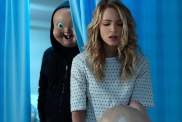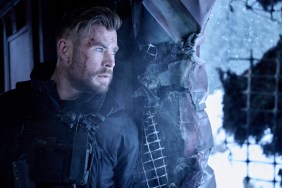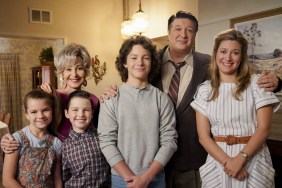Ashton Kutcher stars as Evan Treborn in the psychological thriller The Butterfly Effect, opening nationwide this Friday. Treborn ties his emotional scars in adulthood to the frequent blackouts he had as a child. As he begins to unravel intensely personal truths about his childhood circle of friends, Evan decides to risk everything in a bold attempt to change the past, hoping to save the people he loves even if it means destroying everything he knows.
“I looked at the character from the get-go when I read the script and I thought, okay, in real life what would this guy’s illness be, what would his mental disorder be? I kind of likened it to disassociation disorder or post traumatic stress disorder, which is what I said, okay, this is what this character has,” says Kutcher about the character. “He blocks out all the traumatic moments in his life and I thought to myself wow, what a fantastic metaphor of how people are in everyday life. We block out the traumatic stuff that goes on in the world. That’s the reason why pedaphilia in the movie is freightening to us because it’s something that as a society of people we block out. We decide not to think about the fact that somewhere a baby got blown up, or that in some country halfway across the world there are five-year-old girls being prostituted out in a brothel. To start with, I thought what a great metaphor for people in general, and then what a great character and this is his disorder. Then psychologically, I thought okay, in our lives can we go back into our pasts and change the mistakes we’ve made, the things we’ve done wrong, the relationships that we have wronged? And I thought to myself absolutely. Every time you have a relationship that’s not working or you’ve done someone wrong, can you fix that? Yeah, you can call that person up or get with that person and go, ‘I made a mistake. I screwed up.’ Let’s mend our releationship. So you can change your past today, right now.”
A good script and lots of planning helped bring the time travel theory to life. “Sitting with the directors and really understanding their vision of how they were going to make this time travel exist and these alternate realities exist, it took a lot of diligent planning on their behalf and a really creative script. With that, we just took 100 percent confidence in admitting that this is really happening. With that, created the different characters in the different realities and plugged in a lot of little pieces and a lot of little things spinning out of control-even in the first very little flashback that I have, there are subtle changes that we made. When I’m first sitting with the girl on the bed, and the first time I flip, even for that one little second, when I came out of that reality, if you look really close my character had earrings, and I’m wearing different earrings in the present, just because that much of a little start in going, what’s going on here may have changed. Something as miniscule as that.
The film was shot in Vancouver to keep costs down and it helped in researching the characters as well. “The reason we shot in Vancouver – I would always prefer to shoot in the States – was that we made the movie for 9 million dollars, which isn’t a lot. Canada, with the tax breaks and things you get, that’s why we shot it there. The location matched somewhat of an East coast feeling of the United States. What was fantastic about Vancouver was that it offered us an opportunity to do some great research for [Amy Smart’s] character, and my character as well, because there’s an area of town that’s probably the heaviest concentrated heroin-abused area in North America. It’s a street called Hasting Street, which is right in the middle of the city, and it’s just heroin junkies up and down the street using, banging heroin out in public. We went down there and we were being propositioned to buy heroin and just intermingling with people that were high on heroin. What coincidentally is also one of the outlets which people with post-traumatic stress disorder or disassociation disorder use to block out what they don’t want to face.”
This is Kutcher’s first turn in a dramatic role on the big screen, which presented challenges just like any other role. “A character is a character. This character was pretty disturbed and what was really tough was in order for me to be confident when the cameras started rolling, a lot of the time in between scenes, I had to stay really focused on what it was we were doing and I couldn’t be screwing around and pissing off. I had to really focus just for my confidence. And now I think I could have a little bit more fun while playing a role like this because I kind of know how to get there. For me it’s tough to do comedy because you’re always trying to come up with new jokes and new things and this and that, and it’s pretty quick like that. But this movie had its own challenges, a very tight budget, the kids that were playing the younger versions of us actually shot after we shot principal photography. So we had to spend a lot of time with them. Instead of having them mimic us or being the younger versions of us, we were trying to get their mannerisms down and figure out how they walked, how they sat in a chair, how they talked, their speech patterns. It made it tough. The character was tricky. I think that if I had to play this character in a comedy, I think that it would be just as tough.”
What would Kutcher change about his life if he could? “There’s a lot of things that I’ve done that I would’ve done differently, so I’m actively trying to do them differently. For example, relationships that I’ve had, whether it be with family or friends that have maybe mistreated someone, or haven’t been available for someone. It’s apologizing for what you’ve done wrong and fixing it, and changing yourself so that you can change who you are. We do have that ability and we don’t have to go through time travel to do that.”
His relationship with Demi Moore has certainly put the spotlight on him now, which has made him more aware of every action he takes. “I think the lesson that I have learned is that every single action you make counts, which I think ironically is the lesson of this movie – that every action that you make in your life, somebody’s watching. Somebody’s making a judgment, somebody’s saying something. But eventually you just kind of get to a place where you’re like, okay, this is life. This is living, I can’t be hung up on it.”
Kutcher’s hit MTV series Punk’d is now over and while his friends and other actors can now relax, he himself can too. “You know what’s really nice is that I don’t have to worry about people trying to get me back. That was the most calls we got to our office, were people said that their great idea for ‘Punk’d’ was to get me. So I don’t have to be so camera savvy as to where the hidden ones are in every room that I go into.”










